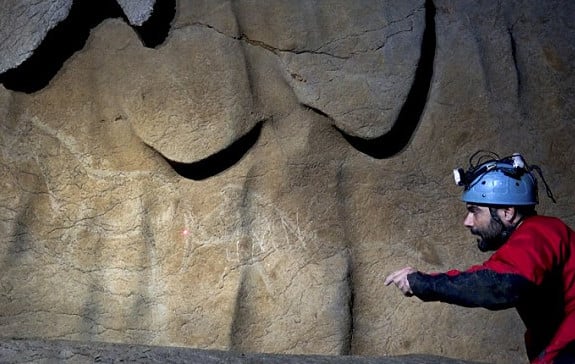
An archaeologist and a recreational cave explorer recently discovered at least 70 ancient cave paintings in the Atxurra caves in northern Spain. Although a team located the caves in 1929, the paintings are nearly 1,000 feet inside, and are barely visible to the untrained eye, so they haven’t been seen until now.
Archaeologist Diego Garate and caver Iñaki Intxaurbe saw the 12,500- to 14,500-year-old works, which would have been made during the end of Upper Paleolithic era, and feature hunting scenes, horses, bison, and goats. The Daily Mail reports that researchers have found evidence that the markings may have contained black coal dust, and were made using flint tools.
Some of the newly-discovered cave paintings in Spain’s Atxurra cave. Courtesy of AFP/Getty Images.
As ancient as the artworks are, they actually are fairly recent creations compared to those cave paintings discovered on the Indonesian island of Sulawesi in 2014. Those paintings, at least 40,000 years old, are believed to be the world’s oldest-known artwork. That same year, archaeologists also discovered the first known artwork by the Neanderthals, a hashtag mark in Gorham’s Cave in Gibraltar.
Maintaining and preserving such works for future generations is challenge due to their fragile nature, and prehistoric cave paintings in many sites around the world, including 30,000-year-old artwork in Australia and rock paintings in Africa, are considered endangered.
Some of the newly-discovered cave paintings in Spain’s Atxurra cave. Courtesy of AFP/Getty Images.
Spain boasts a number of significant ancient cave paintings, including the Altamira Caves, known as the Sistine Chapel of Palaeolithic art. After decades of tourism, the popular attraction had suffered significant damage due to the large number visitors and was forced to close in 2002, but began allowing limited tours again in 2014. Researchers will continue to the study the Atxurra cave paintings, but the site will not be made open to the public.
The new find is not the first in recent years for Spain’s Basque region, where a group of 18,000 year-old cave paintings was discovered in January 2015. Europe’s oldest-known artwork, a group of cave paintings at France’s Grotte Chauvet from 36,000 years ago, received World Heritage Status by UNESCO in 2014.